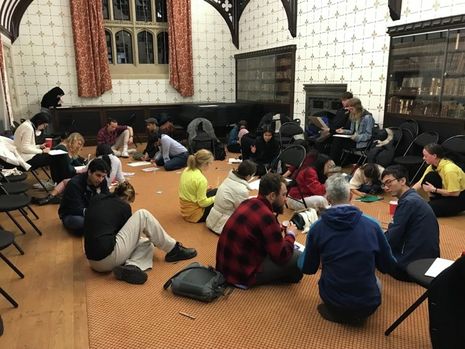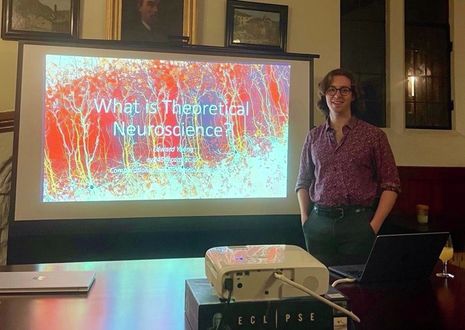The blurred lines between science and humanities: Luminomelia
Izzy Matear and Senior Science Editor Suchir Salhan talk to Cambridge’s round-table discussion society to learn about the philosophical questions that underpin scientific practice

Within the University, there is sometimes the assumption that the sciences and humanities exist in separate spheres. One of experiments and numbers, and another of literature and art. Yet, the boundaries between the two disciplines are becoming increasingly blurred – with ethical questions becoming increasingly important in scientific discourse.
Enter Luminomelia: a philosophy society that frequently has science as a focal point for discussion. Tackling subjects from ‘public distrust in science’ to ‘is ADHD real?’, Luminomelia does not shy away from intricate scientific topics. I sat down with the current co-presidents Edward Young and Sam Phoenix Clarke to discuss how this society merges science and philosophy and why it is important.
With science students in Cambridge increasingly able to take up humanities options (e.g History and Philosophy of Science or medics intercalating in humanities subjects), Luminomelia provides a forum for discussion and debate.
"People put science on a pedestal, and refuse to acknowledge that it happens in a socio-political context"
Founded in 2014, Luminomelia is Cambridge’s largest philosophy society and aims to allow people to “discuss things and argue with one another and have some sort of back and forth”. The weekly session consists of a short, roughly 15-minute talk, followed by a round-table discussion where everyone is free to pitch in their ideas and views on the topic. This is a somewhat unique approach, flipping the standard practice of a long talk followed by a swift Q&A session, designed to prioritise dialogue.
For instance, speaker Natalia Zdorovtsova in a round-table discussion earlier this term outlines how the issues associated with formally classifying neurodevelopmental conditions with a set of medical labels have led some to question the legitimacy of ADHD. In her round-table discussion, she offers three arguments to demonstrate the reality of ADHD – formal medical classification; the “lack of agency” that people suffering from ADHD face in controlling their own behaviour; and a biological essentialist argument that ADHD is grounded in genetic or biological materiality.
While the society often contemplates scientific issues, with this term’s focus on ‘Science in Society’, Sam emphasises that they are “self-consciously and deliberately interdisciplinary,” and have had “English students, linguists, historians, scientists, mathematicians” attend the sessions. This varied-background aspect of the society is also evident in the co-presidents themselves. Edward started as a mathematician before transitioning into neuroscience, while Sam began in psychology before moving over to sociology and politics.
As previous participants before assuming their president roles, Sam and Edward emphasised that Luminomelia is a “welcoming space” for those who don’t know much philosophy or haven’t studied science. Attendees are encouraged to participate in the discussion via a hand gesture system to signal that they would like to speak, but there is no pressure to do more than observe. While Edward confessed to being “overconfident” when he first began going to sessions, Sam was originally much more reserved and only began contributing later down the line.

But why is there a need for conversation around science and its practice at all?
Edward asserts: “Science is sometimes a lot more complicated than people originally take it to be”. He remarks that often people may “deify” science and put it on a pedestal, and “refuse to acknowledge that it happens in a socio-political context”. He points out the influence society has on science, through the allocation of funding and which questions are seen as important. So, while a certain subsection of the STEM population may loathe the fact that science is up for debate, ultimately “science is a human activity”.
Sam and Edward were keen to stress however, that Luminomelia is not aiming to “undermine the power and authority of science” but attempts to use philosophical debates to ‘illuminate’ certain aspects of science such as ethics. Science is typically granted authority within the general public, so, therefore, has certain moral obligations such as honest communication. However, Edward argues that in certain disciplines there is “a lack of the kinds of things that we really value in science”, which is a “massive problem”. Without philosophical debates around scientific practice, therefore, there is little to uphold the integrity of science that affords it a certain status and reverence.
While Luminomelia may not itself directly serve to reform the scientific institutions, it is a society that succeeds in this important task of integrating science and philosophy, which could form a foundation for interdisciplinary policy-making on the fundamental ethical and philosophical issues that underpin science and medicine.
 News / Proposed changes to Cambridge exam resits remain stricter than most7 May 2024
News / Proposed changes to Cambridge exam resits remain stricter than most7 May 2024 News / Cambridge students set up encampment calling for Israel divestment6 May 2024
News / Cambridge students set up encampment calling for Israel divestment6 May 2024 Features / Cambridge punters: historians, entertainers or artistes? 7 May 2024
Features / Cambridge punters: historians, entertainers or artistes? 7 May 2024 Sport / The ‘netball girl’: myth or reality?7 May 2024
Sport / The ‘netball girl’: myth or reality?7 May 2024 Theatre / A nuanced and neurodivergent Carrie comes to the ADC6 May 2024
Theatre / A nuanced and neurodivergent Carrie comes to the ADC6 May 2024






